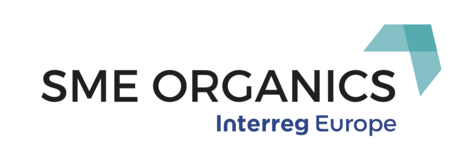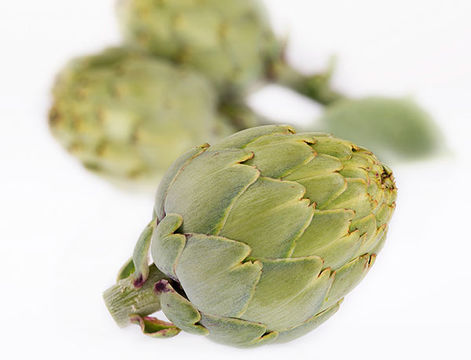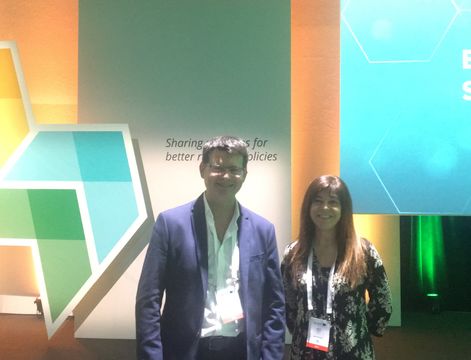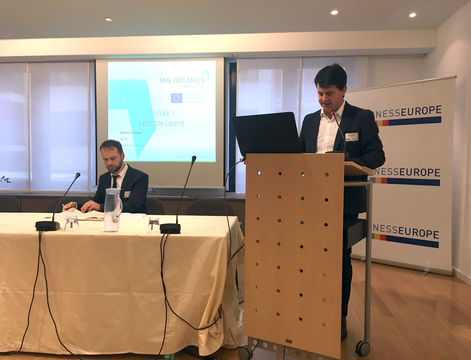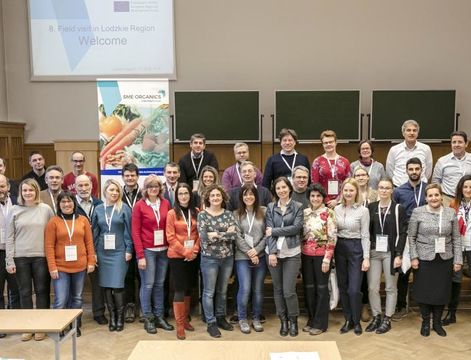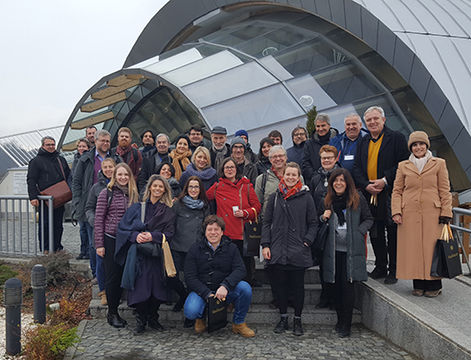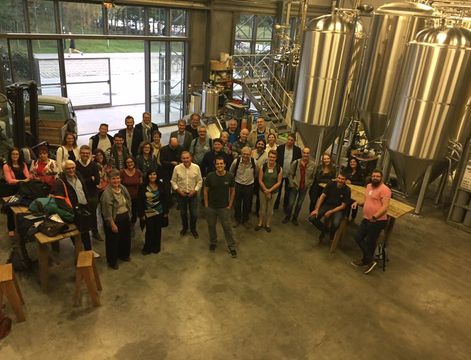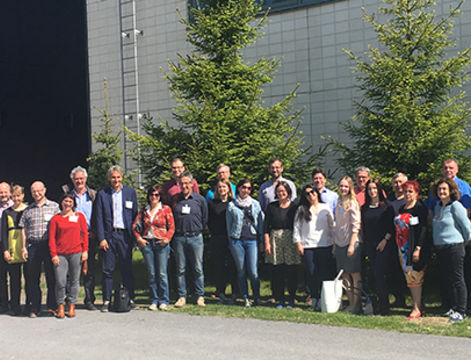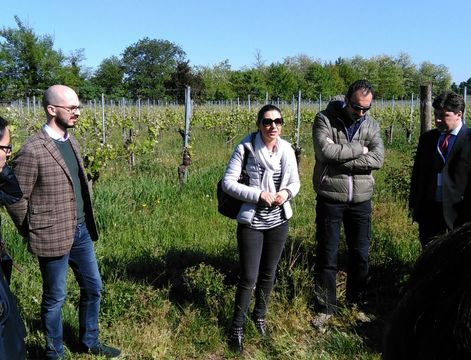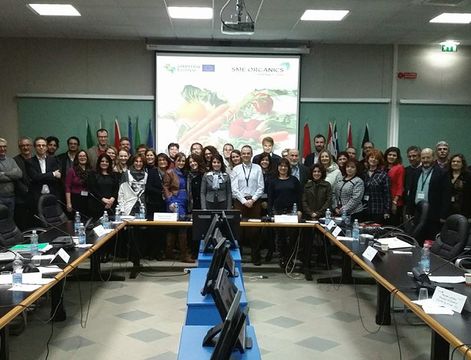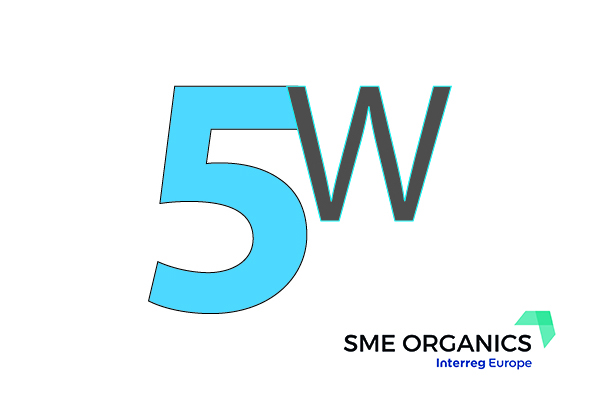Nouvelle-Aquitaine is the 3 rd organic region in France with more than 200.000 hectares (5 % of the total area cultivated), 4.800 producers and 1.500 companies for processing and distribution.
The sixth inter-regional visit of SME Organics was held from 20 th to 22 nd of September and focused on the organic value chain organisation and public procurement.
The first day was introduced by Jérôme Orvain, regional councilor for organic agriculture who presented the Regional pact for organic food and farming and the Region’s Nouvelle-Aquitaine support to organic. The rest of the day was dedicated to the work on Organic action plans development, with presentations of three drafts from Aargau, Navarra and Puglia, group workshops moderated by the IFOAM team and discussions on different matters related to the implementation of the action plans.

The second day started with a presentation of INTERBIO Nouvelle-Aquitaine and its missions.
INTERBIO Nouvelle-Aquitaine is a regional interprofessional association that aims at answering the needs of all the professional of the organic food and farming chain (producers, cooperatives, processors, retailers). Its principal actions are the representation of its 192 members to public authorities and other institutions, communication and promotion of the regional organic products,
structuration of the organic value chains and support the introduction of organic products in public catering.
Good practices meeting

Thomas Breuzet, President of the public catering commission at INTERBIO Nouvelle-Aquitaine introduced the public catering cluster. Created in 2012 to answer the needs for support to introduction of organic products in public catering, the cluster is a tool for developing and organizing the reflection and action on local and quality food for catering services in Nouvelle-Aquitaine.
 Edouard Rousseau, Vice-President of INTERBIO Nouvelle-Aquitaine gave a presentation on Val Bio Ouest, an economical cluster for organic food and farming companies. It is mainly directed to processing industries and aims at adding value to raw organic products, answer the consumers’ needs and strengthen the local dynamic.
Edouard Rousseau, Vice-President of INTERBIO Nouvelle-Aquitaine gave a presentation on Val Bio Ouest, an economical cluster for organic food and farming companies. It is mainly directed to processing industries and aims at adding value to raw organic products, answer the consumers’ needs and strengthen the local dynamic.
 The Bio Sud Ouest France Regional brand was launched in 2013, together with the Region Midi-Pyrénées, the brand aims at promoting a local production or supply, supporting regional operators, and proposing a clear identification of local organic products thanks to its label. Partners then reached the organic market situated in the neighbourghood of Les Chartrons, in Bordeaux, where they could enjoy a buffet prepared by La ferme de Crozefond, a family business running a farm and processing different organic products such as dairy products, oil and delicatessen.
The Bio Sud Ouest France Regional brand was launched in 2013, together with the Region Midi-Pyrénées, the brand aims at promoting a local production or supply, supporting regional operators, and proposing a clear identification of local organic products thanks to its label. Partners then reached the organic market situated in the neighbourghood of Les Chartrons, in Bordeaux, where they could enjoy a buffet prepared by La ferme de Crozefond, a family business running a farm and processing different organic products such as dairy products, oil and delicatessen.
Field Visits
In the afternoon, partners left Bordeaux to go on the field and see different initiatives that can be considered as good examples for the development of the organic sector in the region. The pole maraîchage bio of Marmande is a cluster for fair organic market gardening that gathers an agricultural incubator, a back-to- work organisation and an educational garden. Created by Val de Garonne Agglomération, alongside with 5 other local organisations, it aims at supporting the installation of young farmers, maintain the market gardening and promote organic farming and develop training and professional integration.
The Territoire bio engagé label was presented by Jacques Dumais, first deputy mayor at Port-Sainte- Marie who spoke about the reasons of the labellisation of his town. The TBE label was created
by INTERBIO Nouvelle-Aquitaine in 2010 in order to support, reward and promote the local authorities that reached at least one of the goals of the Grenelle Environment Forum: 6 % (now: 8,5%) of the cultivated area for organic agriculture and introduction of 20% of organic products in public catering. This label is free and gives communities the opportunity to communicate about it.
Moreover, they can ask for support to improve the introduction of organic products their public catering services.
Biocoop is the French leader in organic food distribution, it is also well-known for its fairtrade products and its very extensive range of eco-products and cosmetics. Corinne Sedeau, regional delegate, presented the organisation of the cooperative with its multi-professional model, its commitments, its strong communication and the company social responsibility, as well as its economic growth.
Conference and workshops
This Sixth Interregional Field Visit of SME Organics project was also the occasion for partners and stakeholders to discuss all the best practices presented so far during the different field visits. On the third day, partners could speak one-to- one or by groups with other partners to go deeper into the reflection about the good practice they selected and to ask all the questions about the potential of such good practice on their own territory, what they would have to change and how it could be implemented.
